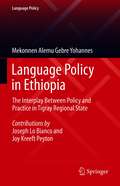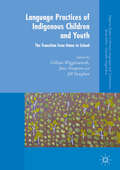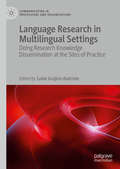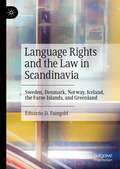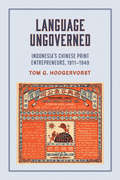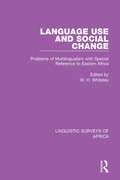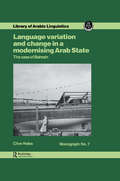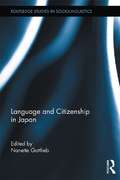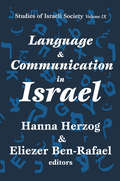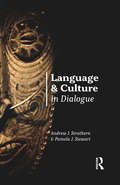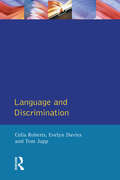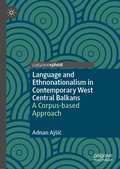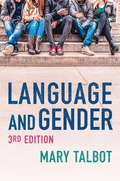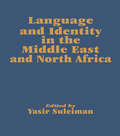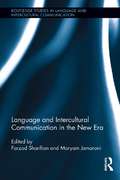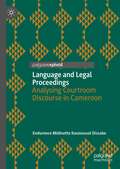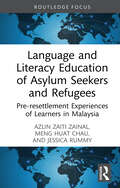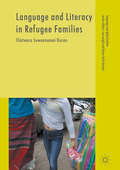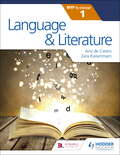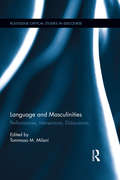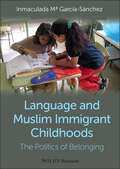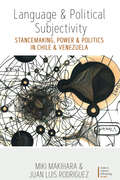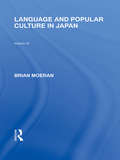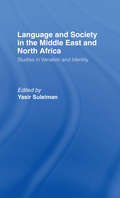- Table View
- List View
Language Policy in Ethiopia: The Interplay Between Policy and Practice in Tigray Regional State (Language Policy #24)
by Mekonnen Alemu YohannesThis book examines the interplay and tensions between hegemonic and counter-hegemonic language policy and processes in Tigray, a regional state of Ethiopia, in the period of pre- and post-1991. Viewing language use and language policy as dynamic social and ideological processes, the book presents Ethiopia as an example of language policy creation and implementation over time, in a highly volatile political context. The case of Ethiopia is unique in that different language policies and practices were put in place as the country’s leaders changed through political takeovers. Declared language policies were not always implemented, and those implemented were often protested. The book starts with an overview and review of language policy and planning, followed by a chapter on the history of such planning in Ethiopia. It then presents the methodology used for the study, and examines the appropriation of hegemonic LPP, patterns of resistance, schools and public sites as centers of resistance, and the emergence and development of specific patterns of language use in different regions of the country. The book ends with recommendations for future research, and draws the overall conclusion that since LPP is a dynamic and multilayered contextual process, official or de facto language policy is often undermined by overt or covert unofficial language policies, ideologies, mechanisms, and agents that result in different patterns of language use.
Language Practices Among Children and Youth in Indonesia
by Bernadette Kushartanti Dwi Noverini DjenarThis open access book presents studies of language use in Indonesia, focusing on children and youth. It reports on developments in the use of language for narrative production and within the realm of popular culture and traditional cultural practices in Indonesia. Through studies that include cohesion in narrative production, language in radio advertising, naming practices and formulaic prohibitions in Javanese, and speech presentation in popular fiction, the book provides insights into how sociocultural changes are reflected in language. This book is a useful resource for students and scholars conducting research on language and cultural practices in Indonesia, particularly in relation to children and young people.
Language Practices of Indigenous Children and Youth
by Gillian Wigglesworth Jane Simpson Jill VaughanChildren all over the world are making the transition from home to school as they enter the formal education system. This volume explores the experiences of language minority children from the age of four, in Australia and around the world as they move from home language to mastering the dominant language of the country.
Language Research in Multilingual Settings: Doing Research Knowledge Dissemination at the Sites of Practice (Communicating in Professions and Organizations)
by Lubie Grujicic-AlatristeThis book describes the steps undertaken by language researchers to disseminate their findings at sites of practice. It discusses questions that arise from such efforts and provides meaningful, real-life, first-hand accounts of both interactions with practitioners and practitioners’ feedback. The authors use narrative accounts, case studies, and semi-ethnographies of focus groups and workshops to draw a full picture of dissemination, its intricacies, multiple stakeholder interests, reflexivity challenges, and future relevance and responsibility for all parties involved. It is an attempt to fill the gap between the end of research domains and the places of dissemination of research findings, and the book will be of interest to applied linguistics researchers, students and scholars of organisational discourse, and practitioners working in multilingual settings.
Language Rights and the Law in Scandinavia: Sweden, Denmark, Norway, Iceland, the Faroe Islands, and Greenland
by Eduardo D. FaingoldThis book examines the language policies in the constitutions, legal statutes, and regulations of Sweden, Denmark, Norway, Iceland, the Faroe Islands, and Greenland. In these countries and territories, modern descendants of Old Norse (North Germanic) are spoken today: Swedish, Danish, Norwegian, Icelandic, and Faroese. In addition, there are regions of Scandinavia where speakers of minority languages were conquered or incorporated, with their languages suppressed or neglected, as well as recent developments in the status and use of English, and immigrant populations who do not speak a Scandinavian language as their native language. This book adopts a comparative approach to trace the development of language policies and rights in Scandinavia, and it will be of interest to students as well as scholars of European and Scandinavian studies, applied linguistics, sociolinguistics, education, political science, and law.
Language Ungoverned: Indonesia's Chinese Print Entrepreneurs, 1911–1949
by Tom G. HoogervorstBy exploring a rich array of Malay texts from novels and newspapers to poems and plays, Tom G. Hoogervorst's Language Ungoverned examines how the Malay of the Chinese-Indonesian community defied linguistic and political governance under Dutch colonial rule, offering a fresh perspective on the subversive role of language in colonial power relations. As a liminal colonial population, the ethnic Chinese in Indonesia resorted to the press for their education, legal and medical advice, conflict resolution, and entertainment. Hoogervorst deftly depicts how the linguistic choices made by these print entrepreneurs brought Chinese-inflected Malay to the fore as the language of popular culture and everyday life, subverting the official Malay of the Dutch authorities. Through his readings of Sino-Malay print culture published between the 1910s and 1940s, Hoogervorst highlights the inherent value of this vernacular Malay as a language of the people.
Language Use and Social Change: Problems of Multilingualism with Special Reference to Eastern Africa (Linguistic Surveys of Africa #22)
by W. H. WhiteleyThe social implications of multilingualism is a field of study on whcih systematic research began only in the second half of the 20th century in Africa. This book, originally published in 1971, contains papers which concentrate on East Africa but it also discusses theoretical problems and methods arising from socio-linguistic studies outside the African field. These include studies on national languages and languages of wider communication in developing nations; the communication role of languages in multilingual societies; and social and cognitive aspects of bilingualism.
Language Variation And Change In A Modernising Arab State: The Case Of Bahrain
by HolesFirst published in 1987. Routledge is an imprint of Taylor & Francis, an informa company.
Language and Citizenship in Japan (Routledge Studies in Sociolinguistics)
by Nanette GottliebThe relationship between language and citizenship in Japan has traditionally been regarded as a fixed tripartite: ‘Japanese citizenship’ means ‘Japanese ethnicity,’ which in turn means ‘Japanese as one’s first language.’ Historically, most non-Japanese who have chosen to take out citizenship have been members of the ‘oldcomer’ Chinese and Korean communities, born and raised in Japan. But this is changing: the last three decades have seen an influx of ‘newcomer’ economic migrants from a wide range of countries, many of whom choose to stay. The likelihood that they will apply for citizenship, to access the benefits it confers, means that citizenship and ethnicity can no longer be assumed to be synonyms in Japan. This is an important change for national discourse on cohesive communities. This book’s chapters discuss discourses, educational practices, and local linguistic practices which call into question the accepted view of the language-citizenship nexus in lived contexts of both existing Japanese citizens and potential future citizens. Through an examination of key themes relating both to newcomers and to an older group of citizens whose language practices have been shaped by historical forces, these essays highlight the fluid relationship of language and citizenship in the Japanese context.
Language and Communication in Israel (Schnitzer Studies In Israel Society Ser. #Vol. 9)
by Hanna HerzogThis volume presents a broad range of the various approaches and questions that preoccupy Israel's sociologists of language and communication. It covers the relation of language and communication to daily life, to social and cultural pluralism, and to politics and elections.
Language and Culture in Dialogue (Criminal Practice Ser.)
by Pamela J. Stewart Andrew J. StrathernIn this book, Andrew J. Strathern and Pamela J. Stewart delineate the relationship between “language in particular” and “culture in general” by focusing on language as both social practice and a means of classifying and interpreting the world. A traditional linguistic approach to a focus on language is illuminated by their anthropological emphasis on the embodiment of relationships and experience. In the book, the body is placed in the foreground for understanding language in culture, which helps in turn to understand how it enables us to adapt to the world of lived material experience. Written in an accessible style and drawing on an extensive corpus of primary field research from Papua New Guinea, Samoa, Japan, Taiwan, Scotland, and Ireland, Strathern and Stewart present a world anthropology which links together European, North American, and Asia-Pacific approaches to the topic. Students and scholars alike of sociocultual anthropology, linguistic anthropology, and linguistics will benefit from this engaging work on how the various components of our culture are informed and shaped through language.
Language and Discrimination (Applied Linguistics and Language Study)
by Celia Roberts Evelyn Davies Tom JuppLangauge and Discrimination provides a unique and authoritative study of the linguistic dimension of racial discrimination. Based upon extensive work carried out over many years by the Industrial Language Training Service in the U.K, this illuminating analysis argues that a real understanding of how language functions as a means of indirect racial discrimination must be founded on an expanded view of language which recognises the inseparability of language, culture and meaning.After initially introducing the subject matter of the book and providing an overview of discrimination and language learning, the authors examine the relationship between theory and practice in four main areas: theories of interaction and their application; ethnographic and linguistic analysis of workplace settings; training in communication for white professionals; and language training for adult bilingual workers and job-seekers. Detailed case studies illustrate how theory can be turned into practice if appropriate information, research, development and training and co-ordinated in an integrated response to issues of multi-ethnic communication, discrimination and social justice.
Language and Ethnonationalism in Contemporary West Central Balkans: A Corpus-based Approach
by Adnan AjšićThis book uses a specialized corpus of public language-related discourse to investigate links between language ideologies and ethnonationalism in contemporary West Central Balkans. Despite a century and a half of shared linguistic history, the nations making up the central part of former Yugoslavia continue to debate the ownership over the common language, creating much animosity, some legal issues, and often absurd circumstances. At the heart of the ongoing language debate over Central South Slavic is the belief in language as the cornerstone of ethnonational identity and the legitimacy of ethnic groups’ claims to sovereignty. Given a history of conflict and the recent resurgence in extreme ethnonationalism, an understanding of ethnolinguistic contestation in the region is as important as ever. This book will be of interest to social scientists working in fields as diverse as (applied) linguistics, anthropology, media studies, political science, sociology and history, as well as other scholars with an interest in language and society.
Language and Gender: An Introduction
by Mary TalbotSince its first publication in 1998, Mary Talbot’s Language and Gender has been a leading textbook, popular with students for its accessibility and with teachers for the range and depth it achieves in a single volume. This anticipated third edition has been thoroughly revised and updated for the era of #MeToo, genderqueer, Trump, and cyberhate. <p><p> The book is organized into three parts. An introductory section provides grounding in early ‘classic' studies in the field. In the second section, Talbot examines language used by women and men in a variety of speech situations and genres. The last section considers the construction and performance of gender in discourse, reflecting the interest in mass media and popular culture found in recent research, as well as the preoccupation with social change that is central to Critical Discourse Analysis. Maintaining an emphasis on recent research, Talbot covers a range of approaches at an introductory level, lucidly presenting sometimes difficult and complex issues. Each chapter concludes with a list of recommended readings, enabling students to further their interests in various topics. <p> Language and Gender will continue to be an essential textbook for undergraduates and postgraduates in linguistics, sociolinguistics, cultural and media studies, gender studies and communication studies.
Language and Identity in the Middle East and North Africa
by Yasir SuleimanThe question of identity in relation to language has hardly been dealt with in the Middle East and North Africa, in spite of the centrality of these issues to a variety of scholarly debates concerning this strategically important part of the world. The book seeks to cover a variety of themes in this area.
Language and Intercultural Communication in the New Era: Language And Intercultural Communication In The New Era (Routledge Studies in Language and Intercultural Communication #10)
by Farzad Sharifian Maryam JamaraniStudies of intercultural communication in applied linguistics initially focused on miscommunication, mainly between native and non-native speakers of English. The advent of the twenty-first century has witnessed, however, a revolution in the contexts and contents of intercultural communication; technological advances such as chat rooms, emails, personal weblogs, Facebook, Twitter, mobile text messaging on the one hand, and the accelerated pace of people’s international mobility on the other have given a new meaning to the term 'intercultural communication'. Given the remarkable growth in the prevalence of intercultural communication among people from many cultural backgrounds, and across many contexts and channels, conceptual divides such as 'native/non-native' are now almost irrelevant. This has caused the power attached to English and native speaker-like English to lose much of its automatic domination. Such developments have provided new opportunities, as well as challenges, for the study of intercultural communication and its increasingly complex nature. This book showcases recent studies in the field in a multitude of contexts to enable a collective effort towards advancements in the area.
Language and Legal Proceedings: Analysing Courtroom Discourse in Cameroon
by Endurence Midinette DissakeThis book investigates language-related problems which arise in courtroom discourse in the Republic of Cameroon, in Central Africa. While Cameroon has over 250 national languages, court cases are conducted in the two official languages: English and French. This is despite the fact that 40% of the adult population is illiterate in these languages, and means that lay litigants often encounter language-related problems during trials. In this study, the author makes use of Speech Act Theory and Interactional Sociolinguistics to analyse the speech acts of both legal professionals and lay litigants as observed in 37 legal cases, demonstrating how the use of exoglossic languages in a highly multilingual nation constitutes a serious issue. The book will be of interest to students and scholars of Forensic Linguistics, Language Policy and Planning, and Discourse Analysis, particularly those with an interest in the African context.
Language and Literacy Education of Asylum Seekers and Refugees: Pre-resettlement Experiences of Learners in Malaysia (Routledge Research in Educational Equality and Diversity)
by Meng Huat Chau Azlin Zaiti Zainal Jessica RummyThe educational experiences of youth refugees and asylum seekers during migration, cross-border movements, protracted displacements, and pre-resettlement phases have largely remained as a black box. Due to the lack of widespread studies on the existential crisis of this population group, our understanding of what transpires during these phases has been rather insubstantial. There are also concerns regarding the decision-making abilities of various stakeholders about pre-resettlement educational provisions for these youths, where the severity of their interrupted formal schooling would have been overlooked. Considering such occurrences, this monograph delves deep into the pre-resettlement educational experiences of a generation of untapped potential from the Myanmar Chin ethnic group in Malaysia, where we attempt to address existing concerns and emerging issues through longitudinal research, analysis, and a series of educational initiatives. This monograph uses an ecological framework to illustrate the complexity of the education ecosystem for refugee youths during phases of transition. It also highlights the significance of a safe, secured, and sustainable informal education system during crucial or emergency times. In particular, the book examines the language learning opportunities and literacy practices, within the premises of sociopolitical, socioeconomic, and sociocultural dynamics, which have shaped the agencies of these students and volunteer teachers who work with them. The monograph further provides recommendations for assisting refugee learners and volunteer teachers in language and literacy education. A multitude of other potential approaches to enhancing the language, literacy, and overall educational development of refugee youths are proposed, with a focus on empowering them as active agents in their learning journey. This book will be of interest to educators, language practitioners, academics, and stakeholders engaged in the provision and development of refugee education, especially in a pre-resettlement and transitional context.
Language and Literacy in Refugee Families
by Chatwara Suwannamai DuranThis book examines the agreements and discrepancies between public understanding and assumptions about refugees, and the actual beliefs and practices among the refugees themselves in a time of increasing mobility fuelled by what many call 'refugee crisis'. With a focus on language and literacy practices among recently-arrived Karenni refugee families in the United States, this book explores the multilingual repertoires and accumulated literacies acquired through the course of the refugees' multiple movements. Through the lens of transnationalism, the author emphasizes that despite their numerous struggles, the refugees daily and diligently use and strategize their old, emerging, and evolving linguistic and literacy resources to make the best of their resettlement. This book will shed light on the language and literacy practices among transnational and diasporic communities, minoritized or marginalized groups for researchers in these fields as well as practitioners and resettlement agencies working with refugee populations.
Language and Literature for the IB MYP 1
by Ana De Castro Zara KaiserimamA concept-driven and assessment-focused approach to Language and Literature teaching and learning.- Approaches each chapter with statements of inquiry framed by key and related concepts, set in a global context- Supports every aspect of assessment using tasks designed by an experienced MYP educator- Differentiates and extends learning with research projects and interdisciplinary opportunities- Applies global contexts in meaningful ways to offer an MYP Language and Literature programme with an internationally-minded perspective
Language and Masculinities: Performances, Intersections, Dislocations (Routledge Critical Studies in Discourse)
by Tommaso M. MilaniThis volume showcases cutting-edge research in the linguistic and discursive study of masculinities, comprising the first significant edited collection on language and masculinities since Johnson and Meinhof’s 1997 volume. Overall, the chapters are linked together by a critical analytical perspective that seeks to understand the relationships between discourse, masculinities, and power. Whereas some of the chapters offer detailed, linguistically informed critiques of the ways in which old and new expressions of masculinities are complicit in the reproduction of men’s hegemonic positions of power, others provide a more complex picture, one in which collusion and subversion go hand in hand. Contributions argue for the need for research on language and masculinities to expand its remit so as to engage with "gay masculinities," and unsettle gendered categories in order to consider the ways in which women, transgender, and intersex individuals also perform a variety of masculinities. Finally, unlike Johnson and Meinhof’s 1997 collection, this volume not only offers a wider—and perhaps "queerer" perspective—on the study of language and masculinities, but also covers a broader geographical and socio-cultural spectrum, including work on Brazil, Israel, New Zealand, Singapore, and South Africa.
Language and Muslim Immigrant Childhoods: The Politics of Belonging (Wiley Blackwell Studies in Discourse and Culture)
by Inmaculada Mª García-SánchezThis revealing analysis of everyday language use among Moroccan immigrant children in Spain explores their cultural and linguistic life-worlds as they develop a hybrid, yet coherent, sense of identity in their multilingual communities. The author shows how they adapt to the local ambivalence toward Muslim culture and increased surveillance by Spanish authorities. Offers ground-breaking research from linguistic anthropology charting the politics of childhood in Muslim immigrant communities in Spain Illuminates the contemporary debates concerning assimilation and alienation in Europe’s immigrant Muslim and North African populations Provides an integrated blend of theory and empirical ethnographic data Enriches recent research on immigrant children with analyses of their sense of belonging, communicative practices, and emerging processes of identification
Language and Political Subjectivity: Stancemaking, Power and Politics in Chile and Venezuela (Studies in Linguistic Anthropology)
by Miki Makihara Juan L. RodríguezPolitics and power are understood as interconnected yet opposed forms of agency that do not exist without each other and depend on transgressions and the upholding of social boundaries. Language and Political Subjectivity is an ethnographic and historical piece of research that considers how Indigenous and diasporic communities, with their political subjectivities, expand over significant sociohistorical changes, debates, and struggles in the transformation of Chilean democracy and Venezuela’s Bolivarian Revolution. It offers an innovative approach to stancemaking as a rhetorical semiotic process that produces truth, beliefs, and certainties about social realities and relations.
Language and Popular Culture in Japan (Routledge Library Editions: Japan)
by Brian MoeranWhen this book was originally published it was the first work of its kind to examine the way in which language is used to express the ‘myth’ of advertising slogans and other popular cultural forms. By making use of general theories from the disciplines of anthropology, linguistics, media studies and semiotics, the book attempts to demystify Japanese culture as it has been hitherto presented in the West, and shows how such cultural forms as ‘noodle westerns’ and high-school baseball uphold the well-known ideologies of ‘selflessness’, ‘diligence’, ‘compliance’ and ‘co-operation’ typically associated with the Japanese. Ultimately, the book poses the question: are those whom we call the Japanese ‘real’ people in their own right, or merely a nation acting out a part written for them by Western civilisation?
Language and Society in the Middle East and North Africa
by Yasir SuleimanThis book investigates issues of central importance in understanding the role of language in society in the Middle East and North Africa. In particular, it covers issues of collective identity and variation as they relate to Arabic, Berber, English, Persian and Turkish in the fields of gender, national affiliation, the debate over authenticity and modernity, language reforms and language legislation. In addition, the book investigates how some of these issues are realized in the diaspora at both the micro and macro levels.
